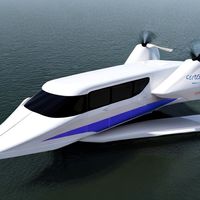In the serene expanse of Sweden’s innovation landscape, a startup named Candela has emerged as a beacon of progress, securing a staggering $14 million in funding and elevating its Series C round to an impressive $40 million. This financial triumph has propelled the company’s overall funding to nearly $90 million, a testament to the growing recognition of its groundbreaking work in the realm of electric passenger vessels.
Candela’s crowning achievement lies in the sale of its first P-12 ferry in the United States, a testament to the escalating demand for the world’s fastest and most extended-range electric passenger vessel. This vessel, set to be operated by FlyTahoe, promises to revolutionize transportation across Lake Tahoe, a majestic freshwater lake straddling the border of California and Nevada. Known for its pristine blue waters and proximity to premier ski resorts, Lake Tahoe is a haven for over 15 million visitors annually, who often find themselves battling traffic congestion, especially during the winter months when heavy snowfall leads to road closures.
The P-12 ferry, with its sleek design and cutting-edge technology, offers a solution to this logistical challenge. It is designed to traverse Lake Tahoe along a north-south route at a speed of 25 knots (30 mph), slashing travel time from an hour by car to a mere 30 minutes. In doing so, it eliminates emissions, providing a cleaner, quieter alternative to traditional transportation methods.
It’s a paradox that as millions of us, myself included, drive around Lake Tahoe to appreciate its beauty, the road sediment we create contributes to the lake’s most significant threat: the preservation of its iconic cobalt blue clarity,” noted Ryan Meinzer, FlyTahoe’s founder and CEO. The P-12’s computer-controlled hydrofoils elevate the vessel above the water, reducing drag and cutting energy consumption by 80% compared to traditional boats. This technology also ensures a smooth, silent ride, unaffected by waves or wind.
The integration of Candela’s ferry into Stockholm’s public transport system marks another milestone, with the P-12 now running a 15km route from the suburb of Ekerö to the city center, halving a 55-minute commute. Candela estimates that 120 of its shuttles could replace Stockholm’s entire fleet of 35 diesel ferries, a transition that promises significant environmental and economic benefits.
Candela’s CEO, Gustav Hasselskog, is optimistic about the financial benefits of this transition. “Contrary to many green technologies, our solution is more cost-effective, cheaper to operate, and less expensive to maintain,” he shared during a visit to the company’s headquarters earlier this year. With a fresh influx of funding, Candela is now poised to fulfill orders from New Zealand, Berlin, Saudi Arabia, and the United States, as it prepares for its most significant growth phase yet.
“Our technology provides a compelling economic incentive to transition to zero-emission fleets while tapping into the potential of waterways to alleviate road congestion and facilitate multi-modal urban travel. This investment is timely for our planet,” Hasselskog stated in a press release.
The funding round was led by SEB Private Equity, a global private equity investor, with participation from existing investors EQT Ventures and KanDela AB. This financial backing is not just an endorsement of Candela’s technology but also a vote of confidence in the company’s vision of a future where waterways play a pivotal role in sustainable transportation.
As the world grapples with the challenges of climate change and urban congestion, Candela’s P-12 ferry stands as a shining example of how innovation can provide practical, eco-friendly solutions. It is not merely a vessel but a harbinger of change, signaling a shift towards a more sustainable mode of transportation that is not just environmentally responsible but also economically viable.
The journey ahead for Candela is fraught with challenges, as it navigates the complex waters of international markets and regulatory landscapes. However, with its proven technology, robust financial backing, and a clear mission to transform urban mobility, Candela is well-equipped to steer towards a future where zero-emission water travel is the norm rather than the exception.
In conclusion, Candela’s success is more than just a financial achievement; it is a narrative of how innovation, sustainability, and investment can converge to create a ripple effect across industries and geographies. As the company charts its course towards new horizons, it carries with it the promise of a cleaner, quieter, and more efficient mode of transportation that could very well redefine the way we traverse the world’s waterways.
